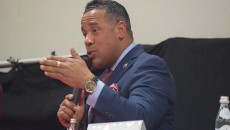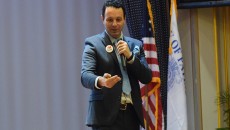After years of paying ever increasing health insurance expenses, forcing large tax increases on homeowners, the city is moving to the state health insurance program by Jan. 1, 2019.
The switch from the city’s self-insured program to the state plan will save $206.5 million over seven years, from fiscal year 2019 through 2025, according to projections provided to the City Council on Tuesday night.
During that period the city’s self-insurance program cost increases from $62.3 to $96.1 million while the state plan cost gradually moves from $41.9 to $56.1 million.
“The overarching goal is to save the city money,” said business administrator Vaughn McKoy. Cost for the self-insurance program jumped from $46.6 million in fiscal year 2014 to $59.1 million in 2018.
Paterson spends 19-percent of its budget to pay for employee health insurance. Jersey City spends 16 and Newark 15.7-percent, according to fiscal 2018 data presented to the council.
The city’s program covers 2,344 employees and retirees.
McKoy said the city held a meeting last week with 19 employee union to pitch the move. Tenor of the meeting was positive, he said.
The unions ratified contracts that included a clause allowing the city to make the move to the state plan.
Employees will pay smaller contributions, said officials. Instead of having 2 plan options, employees will get to choose from 18 plans, said the business administrator.
Council members will vote on three measures next week to join the state program.
Council president Maritza Davila wanted to know if any employee undergoing medical treatment will face interruptions.
Dominick Cinelli of Brown and Brown replied in the negative. It’s the same network, he said, referring to the Horizon Blue Cross Blue Shield of New Jersey.
“We have all the doctors in-network,” said Cinelli.
Al Abdelaziz, 6th Ward councilman, wondered about the savings. He said the city’s school district dropped out of the state program to save money.
Cinelli explained the state runs two programs. He said one covers municipal employees and the other teachers. Both are very different programs, he noted.
“What was the driving factor for these increases?” asked Flavio Rivera, councilman at-large, referring to the big cost spikes in the past years.
The cost escalated for the self-insurance program due too many ill employees. Some racked up half-million in medical bills, officials said earlier in the year.
Rivera asked why the city did not implement a stop-loss plan to contain costs. Stop-loss coverage would kick in when an employee’s health care cost exceeds a certain threshold.
“The city looked at the cost. It wasn’t advantageous to buy stop-loss coverage,” said Cinelli. His firm has been providing consulting services to the city for three years.
Some employees were also using expensive compound drugs. The city’s plan allowed employees to get a 90-day supply of drugs.
“Someone prescribes a new drug for 90 days, you take it the first two or three days and it doesn’t agree with you, you’re throwing out 88 days of that drug and getting a new drug,” said Cinelli.
The state plan has controls to protect against such waste, according to Cinelli.
“Did we have controls here? For compound medication?” asked Rivera.
“No. We don’t have controls,” said Cinelli.
Rivera criticized past administrations for failing to take steps to keep medical costs down.
“It’s a shame. Year after year, you see these huge increases and the administrations that were here before, did not take proper actions to address a lot of these issues,” said Rivera.
Some retirees, 40 to 100 of them, may not be eligible for the state program, said McKoy.
“We have to maintain our self-insurance for those?” asked Rivera.
“Yes,” said McKoy. In the past, municipal officials have said those employees will be enrolled into premium based plans.
The city’s dental plan will not be shifted to the state program, said McKoy. He noted the switch to the state plan has been discussed for years.
Brown and Brown will assist employees to transition to the new program over the next 90 days.
Email: [email protected]



